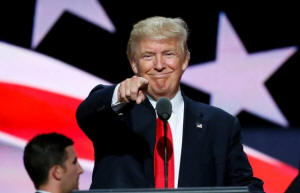|
Trump NATO plan would be sharp break with
decades-long U.S. policy
 Send a link to a friend
Send a link to a friend
 [July 22, 2016]
By Patricia Zengerle [July 22, 2016]
By Patricia Zengerle
WASHINGTON (Reuters) - Republican foreign
policy veterans and outside experts warned that the suggestion by
Republican presidential nominee Donald Trump that he might abandon
NATO's pledge to automatically defend all alliance members could destroy
an organization that has helped keep the peace for 66 years and could
invite Russian aggression.
"Statements like these make the world more dangerous and the United
States less safe," Senator Lindsey Graham of South Carolina, a Trump
critic who is one of the Republican Party's leading foreign policy
voices and a member of the Senate Armed Services Committee, said in a
statement on Thursday.
"I can only imagine how our allies in NATO, particularly the Baltic
states, must feel after reading these comments from Mr. Trump. I'm 100
percent certain how Russian President Putin feels – he's a very happy
man," he said.Trump's comments in a New York Times interview "would seem
to put him on the same page with Mr. Putin," Richard Armitage, who was
deputy secretary of state in the George W. Bush administration, said in
an interview with Reuters.
In the New York Times interview, Trump, in response to a question about
potential Russian aggression toward the Baltic states - Latvia,
Lithuania and Estonia - said that if Moscow attacked them, he would
decide whether to come to their aid only after reviewing whether those
nations "have fulfilled their obligations to us." He added, "If they
fulfill their obligations to us, the answer is yes."

"It's the end of NATO," Robert Hunter, a former U.S. ambassador to the
alliance under President Bill Clinton, told Reuters. "The essence of
NATO, more than any other single factor, is the commitment of the United
States of America to the security of the other 27 members."
Asked about Trump's comments, European Union foreign policy chief
Federica Mogherini said the EU knows it needs to "work more on our
defense capabilities," but said the United States needs to keep
solidarity with its allies.
"It's very simple to realize that in the world of today, which is quite
a complicated one and quite a dangerous one, you need friends," said
Mogherini, who spoke in Washington at the Carnegie Endowment for
International Peace.
"INFLAMMATORY REMARKS"
A letter signed by a bipartisan group of 39 national security experts
said Trump's "inflammatory remarks" do not represent the interests of
the United States.
"The strength of our alliances is at the core of those interests," said
the group, which includes prominent Republicans such as former Homeland
Security Secretary Michael Chertoff and former State Department official
Eliot Cohen.
The United States must uphold the North Atlantic Treaty Organization's
commitments "to all of our allies, including Poland, Estonia, Latvia and
Lithuania," the letter said.
U.S. Senator Bob Corker, chairman of the Senate Foreign Relations
Committee, said the mutual defense commitment was the essence of the
Atlantic alliance.
But he added that both Republicans and Democrats "are becoming
exasperated that most members of the alliance are not honoring their
obligations" for military spending, Corker, a Tennessee Republican, said
in a statement.
[to top of second column] |

Republican presidential nominee Donald Trump points at the gathered
media during his walk through at the Republican National Convention
in Cleveland, U.S., July 21, 2016. REUTERS/Rick Wilking

Responding to Trump's suggestion that his decisions would depend in
part on whether states that were attacked were meeting their
financial commitments to the alliance, former diplomat Richard
Haass, president of the Council on Foreign Relations, said it is
important not to see NATO or any alliance solely in budget terms.
"More important is the net benefit the U.S. derives from the
stability and security of the country and region affected and the
price the U.S. would pay if stability were to be lost or its
interests undermined," Haass told Reuters.
Article 5 of the Washington Treaty, which created NATO in 1949 and
calls an attack on one member an attack on all, has been invoked
once - to help defend the United States after the attacks of Sept.
11, 2001.
Following the attacks, NATO sent AWACS planes to patrol over U.S.
skies, with more than 800 crew members from 13 NATO countries flying
over 360 sorties. As part of the eight measures approved to support
the United States, NATO, about three weeks later, sent elements of
its Standing Naval Forces to patrol the Eastern Mediterranean and
monitor shipping, expanding that to include the entire Mediterranean
several months later.
A NATO official, speaking on condition of anonymity, also noted that
the alliance "deployed a third of the troops in Afghanistan for over
a decade, where over one thousand soldiers from non-U.S. NATO allies
and partners gave their lives.”
Still, some experts downplayed Trump's comments, even as they
criticized them.
Kurt Volker, who was U.S. ambassador to NATO under both Republican
President George W. Bush and Democratic President Barack Obama, said
it was inadvisable to create doubts in adversaries' minds about the
consequences they would face if they invaded a country.

"Putin loves it," Volker said.
But he said the general European attitude was to take Trump's
pronouncements with a grain of salt. "Everyone knows it's an
election campaign," he said.
(Additional reporting by Jonathan Landay, Yara Bayoumy, Warren
Strobel, Roberta Rampton and Doina Chiacu in Washington and Emily
Stephenson and Ginger Gibson in Cleveland; Editing by Leslie Adler
and Jonathan Oatis)
[© 2016 Thomson Reuters. All rights
reserved.]
Copyright 2016 Reuters. All rights reserved. This material may not be published,
broadcast, rewritten or redistributed. |